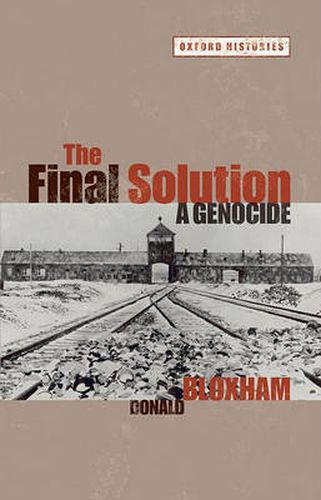Readings Newsletter
Become a Readings Member to make your shopping experience even easier.
Sign in or sign up for free!
You’re not far away from qualifying for FREE standard shipping within Australia
You’ve qualified for FREE standard shipping within Australia
The cart is loading…






The Holocaust - the murder of Europe’s Jews by Nazi Germany - has too often been depicted in isolation by its historians. The Final Solution: a Genocide is the first study to combine a detailed re-appraisal of the development of the genocide of the Jews with full consideration of Nazi policies against other population groups, and a comparative analysis of other modern genocides. Moving beyond a narrow focus on Nazi Germany, Donald Bloxham provides a broad perspective on a whole continent in crisis from the late nineteenth century onwards and considers the Holocaust as the culmination of a much wider history of European genocide and ethnic cleansing. Ultimately, he shows that an explanation for the Holocaust rooted exclusively in Nazism and antisemitism is necessarily inadequate when set against one prepared to give due weight to the immediate circumstances of the Second World War in eastern Europe, and to situate the Jewish genocide within the broader patterns of human behaviour in the late-modern world.
$9.00 standard shipping within Australia
FREE standard shipping within Australia for orders over $100.00
Express & International shipping calculated at checkout
The Holocaust - the murder of Europe’s Jews by Nazi Germany - has too often been depicted in isolation by its historians. The Final Solution: a Genocide is the first study to combine a detailed re-appraisal of the development of the genocide of the Jews with full consideration of Nazi policies against other population groups, and a comparative analysis of other modern genocides. Moving beyond a narrow focus on Nazi Germany, Donald Bloxham provides a broad perspective on a whole continent in crisis from the late nineteenth century onwards and considers the Holocaust as the culmination of a much wider history of European genocide and ethnic cleansing. Ultimately, he shows that an explanation for the Holocaust rooted exclusively in Nazism and antisemitism is necessarily inadequate when set against one prepared to give due weight to the immediate circumstances of the Second World War in eastern Europe, and to situate the Jewish genocide within the broader patterns of human behaviour in the late-modern world.